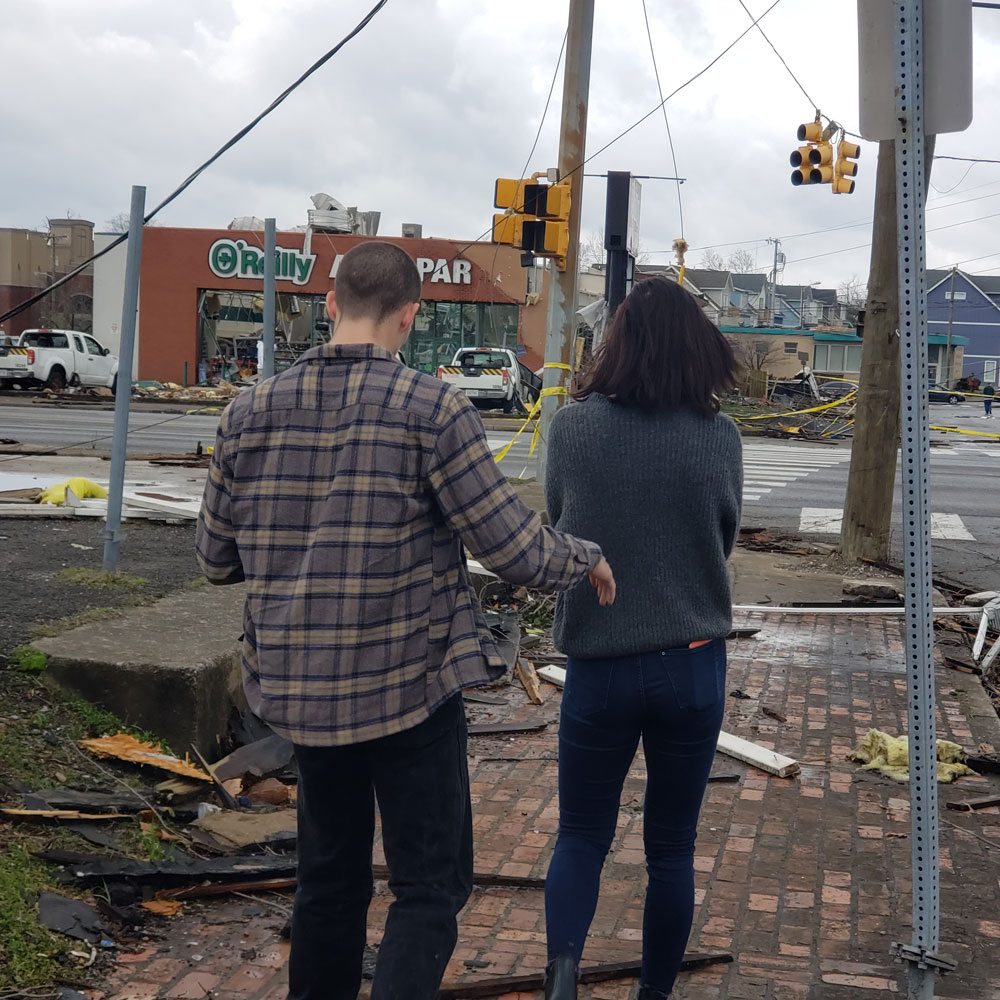
March 8, 2020; City Lab and New York Times
Before we launch into this story, we want to encourage readers to revisit Cyndi Suarez’s influential article on the rebuilding of Puerto Rico following Hurricane Maria. In it, Suarez suggests such work must include an explicit equity lens if it is to avoid the amplification of colonialist tendencies already visited on marginalized communities.
When a tornado’s destructive force ripped through sections of Nashville, Tennessee last week, it energized the community’s best instincts and some of its worst. The pain of lives lost, and the pictures of bodies, homes, and businesses damaged by the storm, spoke loudly. For some, the message stirred their best selves to action; others heard the siren song of economic opportunity waiting to be seized. The future of some of the city’s most vulnerable lies in the balance.
New York Times columnist Margaret Renkl saw individuals and community organizations rise to the challenge in remarkable ways. She highlights the best of her community and the energy that is often at the center of our nonprofit sector:
Nashville has responded to the wreckage by urgently pitching in. All across this city, people are showing up to help friends and strangers. They are showing up with work gloves and chain saws and garbage bags and tarps. They are making casseroles by the dozens and sandwiches by the hundreds. They are making repeat trips to big-box stores for flashlights and batteries and blankets and nonperishable food and baby formula and diapers and tampons and hand wipes and over-the-counter medicines, and then they are giving it all away.
Some of this is happening through the expert efforts of existing community organizations like Hands-On Nashville, Gideon’s Army, the Second Harvest Food Bank of Middle Tennessee and the Community Resource Center Nashville. Some of it is happening organically, by word of mouth (or word of media), as people hear from somebody who knows somebody who needs help. Some of it is happening because people keep just showing up and looking around for an opportunity to help.
Rev. Dr. Frank Gordon, pastor of North Nashville’s Fourteenth Avenue Missionary Baptist Church, sees this as the spirit of his city. He described this in comments reported by the Times: “Most of the folks that I have talked with, black and white, all of our heads are pretty much in the same place. We have been through these things before with tornadoes and floods in Nashville. Each time that I recall it has happened, the major thrust in the community has been everybody pulling together.”
Sign up for our free newsletters
Subscribe to NPQ's newsletters to have our top stories delivered directly to your inbox.
By signing up, you agree to our privacy policy and terms of use, and to receive messages from NPQ and our partners.
Others follow the path of former Chicago mayor Rahm Emanuel, who said, “You never let a serious crisis go to waste…it’s an opportunity to do things you think you could not do before.” They see the destruction of a neighborhood as a chance to change its character and population and earn a profit. This part of North Nashville was already an economically distressed area in need of revitalization, with a median income of $29,000, 36 percent of households living in poverty, and many residents facing unstable housing. Under provisions of the 2017 revision to the federal tax code, the state of Tennessee had declared this neighborhood as an “opportunity zone”, offering significant tax incentives to developers but providing minimal guarantees that its current residents will be among the beneficiaries.
The fear is that the rebuilding effort made necessary by the winds will empower those interested in replacing the community’s current residents and spur a new wave of gentrification. As happened in the wake of Hurricane Katrina, current residents will be replaced and forced to rebuild their lives elsewhere for the sake of profit.
Before the tornado’s winds ravaged the neighborhood, Adia Victoria, writing for Nashville Scene, was already worried about the impact of gentrification on her city’s communities of color: “There is a rapaciousness in the air, bordering on the obscene, as the city contorts, bends, shucks and jives to become whatever version of itself will bring about the largest turn of profit. Those positioned to make money do so, while all those standing outside the circle of profit are left on their front porch wondering when their lives will be razed and paved over.”
Many worry that pressure will grow as families with few financial resources face the emotional and financial pressures of coming back from destruction. For Anne Barnett, an organizer with the Central Labor Council of Nashville, the storm opened a Pandora’s box. In comments to CityLab, she said, “Developers have been champing at the bit thinking about that neighborhood for a while. It’s really, really scary to think about how this storm is going to change that neighborhood, not just the way it looks but who lives there and who has equity there.”
Rev. Jeff Obafemi Carr, an activist and former mayoral candidate, shared his concerns with the New York Times. “There has been a gentrification tornado spinning through North Nashville for the last 10 years. You hope that a physical tornado doesn’t become the catalyst for more.”
Barnett believes those intent on snapping up distressed properties from distressed owners were almost immediately in action. “Within two hours, I saw a wealthier-looking, white, middle-aged gentleman walking around, talking to homeowners and handing out business cards. We were cutting a tree out of this elderly lady’s yard, and I was like, ‘What was he talking about?’ She was like, ‘He wanted me to sell my house.’ I was like, ‘Are you fucking kidding me?’” Other observers were not able to confirm this activity but fear such things are true.
What’s needed now is for the community spirit Renkl saw in her friends and neighbors to go beyond emergency response. Families whose homes have been damaged or destroyed need the financial backing to make intelligent decisions about their next steps and not forced, by their need for immediate cash, to jump at purchase offers. Renters whose homes have been destroyed need support to find new housing in their community. And longer-range plans for rebuilding need to keep a place for them in the neighborhood as new housing rises.—Martin Levine












